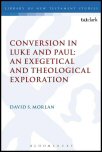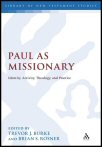T&T Clark Studies on Pauline Missiology (2 vols.)
Digital Logos Edition
Overview
Mission was the central activity in Paul’s work for the gospel. Yet this context is often left unconsidered when scholars study his theology or consider the broader historical context of his life. In this collection, distinguished Pauline and Lukan scholars Brian Rosner, Trevor Burke, and David Morelan help readers come to terms with the how Luke and Paul understood the significance of their missionary work and illuminate key texts that expose similarities and differences between Paul’s and Luke’s theological construct of conversion.
In the Logos editions, these volumes are enhanced by amazing functionality. Important terms link to dictionaries, encyclopedias, and a wealth of other resources in your digital library. Perform powerful searches to find exactly what you’re looking for. Take the discussion with you using tablet and mobile apps. With Logos Bible Software, the most efficient and comprehensive research tools are in one place, so you get the most out of your study.
Get more studies on Paul with the T&T Clark Pauline Studies Collection.

Key Features
- Presents insights on Paul’s missiological methods, historical context, and theoretical concepts
- Examines Paul’s missionary work both in Acts and his epistles
- Examines the purpose of mission and the natue of conversion in Acts and the Pauline letters
Product Details
- Title: T&T Clark Studies on Pauline Missiology
- Series: The Library of New Testament Studies (JSNTS)
- Publisher: T&T Clark
- Volumes: 2
- Pages: 512
- Resource Type: Monographs
- Topic: Acts, Pauline Letters
Individual Titles
- Conversion in Luke and Paul: An Exegetical and Theological Exploration by David S. Morlan
- Paul as Missionary: Identity, Activity, Theology, and Practice edited by Trevor J. Burke and Brian S. Rosner

This study explores the conversion theologies of Luke and Paul. For Luke and Paul, conversion played an important role in the early Christian experience. Morlan offers a fresh look into how they interpreted this phenomenon. Morlan traverses key texts in the Lukan and Pauline corpus equipped with three theological questions. What is the change involved in this conversion? Why is conversion necessary? Who is responsible for conversion?
Morlan presents theological and exegetical analysis of Luke 15, Acts 2 and 17:16–34, Romans 2 and Romans 9–11 to answer these questions, and, in turn, builds theological profiles for both Luke and Paul. These profiles provide fresh insight into the theological relationship between Luke and Paul, showing significant similarities as well as sharp contrasts between them. Similarities surface between Luke and Paul concerning the centrality of Christology in their conversion theologies. While showing a complex relationship between human and divine agency in conversion, both Luke and Paul understand successful conversion to be impossible without the intervention of an agency outside of the pre-convert.
David S. Morlan received his PhD from Durham University and is a pastor at Fellowship Denver Church.

Brian Rosner and Trevor Burke argue that, before anything else, Paul must first and foremost be identified as a missionary. Using the entire Pauline corpus, the contributors to this volume assess what Paul’s correspondence can tell us about how he perceived his role and identity. The work comprises four parts: in section one, Paul’s identity as priest, eschatological herald, and missionary-pastor are explored while in part two topics such as the apostle’s activity among pagans, his suffering, and Paul’s missionary message to the church at Rome are considered. Section three provides essays on the Spirit as the governing dynamic, the glory of God as the apostles missionary goal, and the importance of Paul’s Christology in shaping his mission to the Gentiles. Finally, part four addresses Paul’s missionary praxis, including his support of his missionary enterprise.
Trevor J. Burke teaches New Testament in the Bible department of the Moody Bible Institute in Chicago. Prior to this, he has taught New Testament in seminaries in Nigeria and Fiji.He is the author of Adopted into God’s Family: Exploring a Pauline Metaohor in the New Studies in Biblical Theology series, The Message of Sonship, and coeditor of A Biblical theology of the Holy Spirit.
Brian S. Rosner received his PhD from Cambridge University and is senior lecturer in New Testament and ethics at Moore Theological College in Sydney, Australia. He is the coauthor of The First Letter to the Corinthians in the Pillar New Testament Commentary series, Understanding Paul’s Ethics, and editor of the New Dictionary of Biblical Theology.
This title is included in the following collections
You can save when you purchase this product as part of a collection.
Pauline Studies Collection, 28...
$943.25$395.992025 Orthodox Platinum
$1,499.99$1,199.992025 Orthodox Diamond
$2,999.99$2,249.992025 Orthodox Portfolio
$4,749.99$3,562.49
- $23,999.99$17,999.99